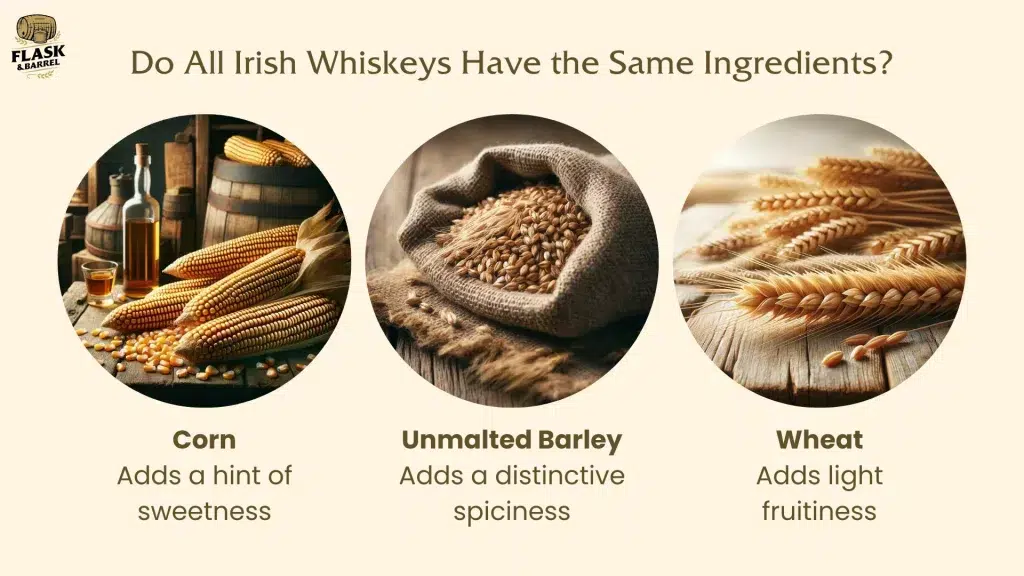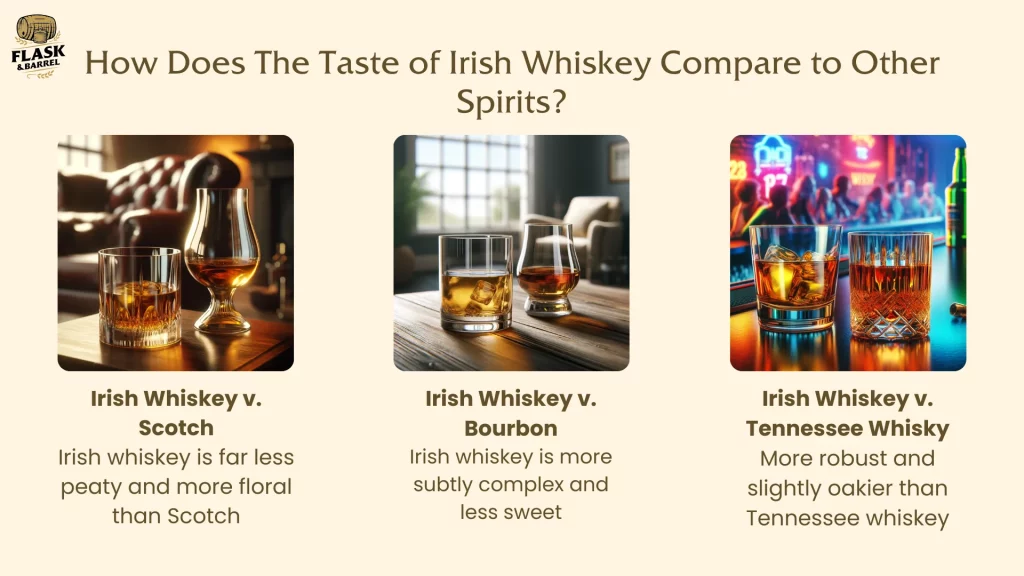Gin, often overshadowed by its more robust cousins like whiskey and rum, carves out a unique space with its botanical complexity and versatility. This distinctive character elevates gin above mere spirit, marking it as a category with its own identity. Central to gin’s appeal are its primary styles: London Dry, Plymouth, and Old Tom, each offering a different palate experience.
What Does Irish Whiskey Taste Like?
Not to be overlooked, Contemporary Gin introduces a modern twist, showcasing a lighter, more experimental approach to botanical mixology. Delving further, each style of gin reveals its own palette of flavors, distillation methods, historical roots, and pairing possibilities with food. The subsequent sections will delve into these facets in depth, providing a comprehensive understanding of why gin holds a revered place in the hearts of spirit enthusiasts across the globe.

Irish whiskey, a revered spirit, is celebrated for its smooth, complex flavor profile that distinguishes it from other whiskeys. Characterized by its primary flavors of malt, honey, and fruit, it offers a soft, approachable palate. Secondary flavors, including vanilla, caramel, and spice, emerge from the aging process in wooden casks, adding depth and richness.
The production process, from triple distillation to the choice of aging barrels, plays a crucial role in shaping its taste. While all Irish whiskeys share a foundation of malted barley, variations in ingredients and aging times contribute to a wide spectrum of flavors. The influence of proof, aging duration, and the whiskey’s origin further diversify its taste, making each bottle a unique expression of Irish tradition.
Whether enjoyed neat, in cocktails or as part of a culinary experience, the best Irish whiskey is versatile and has a distinct flavor profile that makes it a favorite among connoisseurs and casual drinkers alike.
What Are the Primary Flavors in Irish Whiskey?
The primary flavors in Irish whiskey are malt, honey, and fruit. These core tastes define the spirit’s initial impression on the palate, offering a smooth and sweet experience that is approachable yet complex. The malt provides a soft, grainy foundation, while honey adds a natural sweetness.
Fruit notes, often reminiscent of apples, pears, and citrus, introduce a fresh, lively character to the whiskey.
What Are the Secondary Flavors in Irish Whiskey?
As Irish whiskey matures in wooden casks, it develops rich secondary flavors, including vanilla, caramel, and spice. Vanilla and caramel arise from the interaction between the whiskey and the charred wood of the barrels, imparting a creamy sweetness and depth. Spices such as cinnamon and nutmeg add warmth and complexity, enhancing the whiskey’s overall flavor profile.
These secondary notes contribute to the unique and diverse taste experiences found in Irish whiskey, making each sip a journey through layers of flavor.
How Does the Production Process Affect the Taste of Irish Whiskey?
The production process significantly influences the taste of Irish whiskey, beginning with the triple distillation method, which yields a smoother and lighter spirit compared to its double-distilled counterparts. This method removes impurities and concentrates the whiskey’s flavors, ensuring a clean, refined profile. The choice of wooden casks for aging is another pivotal factor; whether using American oak, sherry, or port barrels, each imparts distinct vanilla, caramel, or fruity notes to the whiskey.
Furthermore, the length of aging plays a crucial role, as longer periods allow for a deeper exchange between the whiskey and the barrel, enhancing complexity and richness. The water source used in production also affects the final taste, contributing to the unique character of each distillery’s offering. Together, these elements of the production process craft the distinctive, nuanced flavors that define Irish whiskey.
Do All Types of Irish Whiskeys Have the Same Ingredients?
While all share a foundation of malted barley, the inclusion of other grains varies across different types of Irish whiskey. Some distilleries incorporate unmalted barley, corn, or wheat into their mash bills, contributing to a diverse range of flavor profiles. This variation allows for a spectrum of tastes, from the light and floral to the rich and full-bodied.

Additionally, the source of water, an essential ingredient in whiskey production, introduces subtle differences in taste, influenced by the unique mineral content of each distillery’s local water supply. Consequently, the choice and combination of ingredients play a crucial role in defining the distinctive character of each Irish whiskey.
Does Aging Irish Whiskey Longer Make it Taste Better?
Aging is a critical factor in developing the flavor profile of Irish whiskey, with longer aging periods often leading to a more complex and smoother taste. As whiskey ages in wooden casks, it undergoes a series of chemical reactions, drawing flavors from the wood and mellowing the harshness of alcohol. This process introduces notes of vanilla, caramel, and wood spice, enhancing the whiskey’s richness and depth.
However, the relationship between aging and taste is not linear; beyond a certain point, additional aging can result in an overly woody or tannic flavor, potentially overshadowing the spirit’s delicate balance. Thus, while longer aging can contribute to flavor development, it is the careful selection of aging duration that truly determines the quality of the final product, ensuring a harmonious blend of flavors.
How Does Proof Affect Irish Whiskey’s Flavor?
The proof of Irish whiskey, indicating its alcohol content, plays a significant role in shaping its flavor profile. High proof whiskeys, with their greater alcohol concentration, often exhibit a bolder, more intense flavor, allowing the rich, deep notes of the spirit to shine through. This intensity can enhance the perception of certain flavors, such as spice and wood, making them more pronounced.
On the other hand, low proof whiskeys tend to be smoother and more mellow, with a softer palate that may highlight sweeter, more delicate flavors like vanilla and fruit. The alcohol level can also affect the whiskey’s mouthfeel, with higher proofs offering a more robust sensation, while lower proofs provide a gentler, more approachable drinking experience. Ultimately, the proof of Irish whiskey influences not just its taste but also its character and complexity, catering to a range of preferences among whiskey enthusiasts.

High Proof
High proof Irish whiskey, characterized by a higher alcohol content, delivers a potent, flavor-packed experience. The elevated alcohol level intensifies the whiskey’s inherent flavors, making notes of spice, oak, and peat more pronounced. These whiskeys often appeal to those who appreciate a robust, full-bodied taste, where the complexity and depth of the spirit are at the forefront.
The increased intensity also means that high proof whiskey may offer a warming sensation, ideal for sipping slowly and savoring each nuanced layer of flavor.
Low Proof
Low proof Irish whiskey offers a gentler, smoother drinking experience, with a reduced alcohol content that emphasizes subtlety and finesse. Such whiskeys are marked by their soft palate, where sweeter, lighter flavors like vanilla, honey, and fruit come to the fore. The milder nature of low proof whiskey makes it particularly accessible to newcomers or those who prefer a less intense whiskey experience.
It’s also well-suited for cocktails, where its subtlety can blend harmoniously with other ingredients without overpowering them.
Does Irish Whiskey Taste Better in Cocktails?
Irish whiskey’s versatility makes it a favored spirit for cocktails, blending harmoniously with a variety of mixers to create drinks that highlight its unique flavor profile. The spirit’s smoothness, characterized by notes of malt, honey, and fruit, complements both simple and complex cocktail recipes. In cocktails, the subtleties of Irish whiskey, such as its vanilla and caramel undertones, can be accentuated, offering a balanced and nuanced drinking experience.
Whether in a classic Irish Coffee, where it adds depth and warmth, or in more modern concoctions that play with bitter, sweet, or sour notes, Irish whiskey proves its adaptability and appeal. Thus, whether Irish whiskey tastes better in cocktails is subjective and largely depends on personal preference and the skill with which the drink is crafted.
Does Irish Whiskey Lose its Taste as it Gets Older?
Contrary to what some might assume, Irish whiskey does not continue to age or improve in flavor once it is bottled. The aging process of Irish whiskey occurs exclusively in barrels, where it develops its complex flavors and aromas. Once bottled, the whiskey’s interaction with wood ceases, halting any further maturation.
Therefore, the taste of Irish whiskey remains stable over time when stored properly, away from direct sunlight and at a consistent temperature. However, improper storage conditions can lead to deterioration of the whiskey, potentially affecting its taste. It’s important to note that while the whiskey does not improve with age once bottled, it does not inherently lose its taste over time if preserved correctly.
Where Are the Best Irish Whiskey Distilleries?
Ireland is home to a number of esteemed distilleries that are celebrated for producing some of the finest Irish whiskeys in the world. These distilleries are spread across various regions, each offering a unique contribution to the richness of Irish whiskey. The Jameson Distillery in Dublin and Midleton Distillery in Cork are renowned for their historical significance and exceptional offerings.

In the North, Bushmills Distillery stands out as one of the oldest, producing whiskey with unparalleled smoothness. Dingle Distillery in Kerry and Teeling Distillery in Dublin represent the new wave of Irish whiskey makers, bringing innovative techniques and flavors to the fore. Each distillery has its own distinct methods and traditions, contributing to the diverse and rich tapestry of Irish whiskey.
Whether through guided tours or tastings, visiting these distilleries provides insight into the craftsmanship behind Irish whiskey, making it a must for enthusiasts and newcomers alike.
Is the Flavor of Irish Whiskey Influenced by its Origin?
Yes, the flavor of Irish whiskey is significantly influenced by its origin, with the geographical location of the distillery playing a pivotal role in shaping the whiskey’s unique character. Factors such as the local climate, water source, and even the air quality can impact the whiskey during its production and aging process. For instance, whiskeys produced in coastal areas may adopt a slight brininess, while those from inland regions might highlight fresher, more floral notes.
The terroir, a term borrowed from winemaking, is equally relevant in the world of whiskey, where the environment contributes to the distinctiveness of each bottle. This geographical signature ensures that Irish whiskey not only offers a taste of the spirit but also a sense of the place from which it originates, adding depth and complexity to its flavor profile.
How Does the Taste of Irish Whiskey Compare to Other Spirits?
Irish whiskey stands distinct in the world of spirits, characterized by its smoothness and nuanced flavor profile that sets it apart from other types of whiskey and spirits. Compared to bourbon, which is often sweeter with a pronounced vanilla and oak flavor due to its corn content and new oak barrel aging, Irish whiskey offers a lighter, more approachable taste. When contrasted with Tennessee whiskey, known for its charcoal mellowing process that imparts a smoother flavor, Irish whiskey still maintains a unique profile with its triple distillation process enhancing its smoothness and drinkability.
Scotch, especially single malts, can exhibit a range of flavors from smoky and peaty to light and floral, depending on the region; however, Irish whiskey generally presents a more balanced and less peaty profile, making it versatile and widely appealing. The comparison reveals that while each spirit has its own distinct characteristics, Irish whiskey’s blend of smoothness, complexity, and approachability offers a unique experience in the diverse world of spirits.

The Taste of Irish Whiskey vs. Bourbon
Irish whiskey and bourbon offer distinct taste experiences due to their unique production processes and ingredients. Irish whiskey, known for its smoothness and triple-distilled purity, tends to have a lighter, more approachable flavor profile with notes of fruit, honey, and malt. Bourbon, made primarily from corn, showcases a sweeter palate with robust flavors of vanilla, caramel, and oak.
The differences are rooted in their geographic origins and regulations, with bourbon’s richness and sweetness contrasting with the subtle complexity of Irish whiskey.
The Taste of Irish Whiskey vs. Tennessee Whiskey
Comparing Irish whiskey to Tennessee whiskey highlights the influence of the charcoal mellowing process, known as the Lincoln County Process, used in Tennessee whiskey production. This process imparts a distinctive smoothness and slightly smoky character to Tennessee whiskey, setting it apart from the typically smoother and lighter profile of Irish whiskey. Irish whiskey’s flavor is often characterized by its malt and fruit notes, with a clean finish, whereas Tennessee whiskey may offer a sweeter, richer taste with hints of charred oak.
The Taste of Irish Whiskey vs. Scotch
The taste comparison between Irish whiskey and Scotch reveals a broad spectrum of flavors due to Scotch’s regional diversity. Scotch whiskies, especially those from the Islay region, are renowned for their peaty, smoky qualities, a stark contrast to the generally smooth, mellow character of Irish whiskey. While some Scotch whiskies offer light, floral notes similar to those found in Irish whiskey, the presence of peat in Scotch provides a depth and intensity rarely encountered in Irish varieties.
The triple distillation process common in Irish whiskey production further differentiates it from Scotch, offering a cleaner, more refined taste.
How to Drink Irish Whiskey
Learning how to drink Irish whiskey can be a delightful experience, tailored to personal preferences and the occasion. For purists, drinking it neat is the way to fully appreciate the spirit’s complex flavors and smooth finish. A splash of water can be added to open up the whiskey, enhancing its aromas and subtleties.
For those who prefer a chilled drink without dilution, whiskey stones offer a solution. Irish whiskey also shines in cocktails, where its versatility allows it to blend seamlessly with various ingredients, creating both classic and innovative drinks. Whether sipped slowly to savor its depth or mixed into a refreshing cocktail, Irish whiskey offers a rich tapestry of tasting experiences.





